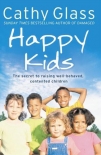Happy Kids by Cathy Glass (best autobiographies to read .txt) 📕

Read free book «Happy Kids by Cathy Glass (best autobiographies to read .txt) 📕» - read online or download for free at americanlibrarybooks.com
- Author: Cathy Glass
Read book online «Happy Kids by Cathy Glass (best autobiographies to read .txt) 📕». Author - Cathy Glass
Don’t be put on a guilt trip into buying material possessions either, just because other children reportedly own them. There are so many ‘must haves’ now and advertising is being directed at younger and younger children. Designer trainers, football team colours and mobile phones are not essential items for starting school, despite what your child may tell you. If your decision is that your child will not be having a mobile phone until he or she is twelve (or whatever age you think is reasonable), that is your decision. It is a reasonable rule and you can explain why to your child.
Tom and Claire are now one of many and no matter how vigilant the playground supervisors are it is impossible for them to monitor every action or hear every word spoken by all the pupils during playtime. Your child, however well behaved he or she is, will be subjected to playground influence, particularly from older and more streetwise children.
Don’t over-react
I have found with all my children, natural and fostered, that when they start school their vocabulary increases dramatically in the first few weeks, though not in a way I appreciate. To hear the words ‘fuck,’ ‘prick’ and, worst of all, ‘cunt’ on the lips of your little treasure is a shock to the most robust and liberal of constitutions. Or to have dear little Tom or Claire tell you over dinner that babies ‘pop out of fannies’ and they got there by ‘the man putting his dick in the woman’s bottom’ is a guaranteed show-stopper and good aide to indigestion.
Your child is only repeating what he or she has heard in the playground and probably won’t have the least idea what they are talking about. Sadly, the child who has told your child this could well be the child I am fostering and whose behaviour I am still in the process of modifying. Before the child came into care he or she will have spent many years living in chaos and neglect, often watching adult television or adult (pornographic) videos late into the night because no one had bothered to put them to bed. They might also have been sexually abused. What these children have seen, heard or experienced doesn’t disappear overnight; indeed it takes months, sometimes years, to undo some of the harm. Sometimes when I walk into the school playground I am met with hostile looks and whispers from other mothers as the ‘owner’ of the child who has sullied their child’s innocence. If such behaviour is brought to my attention I apologise to the parents and then talk to the child I am fostering about what is acceptable and what is not.
Don’t over-react when your child comes out with a gem you would rather not have heard (which I can guarantee every child will do, at some point after starting school). Speak to them calmly and firmly, explaining why it isn’t a nice word to use, and that you don’t want them to use it again either at home or school. Use age-appropriate language to talk to your child about a man ‘putting his dick in a woman’s bottom’ and set the record straight, although not necessarily at the dinner table. A five-year-old doesn’t need to know the exact details of sexual intercourse (and indeed it could appear quite frightening to a young mind), but you can give some explanation which you feel comfortable with, building on what you have already told your child about the facts of life.
If your child persists in swearing, or making inappropriate comments, then, as with all unacceptable behaviour, at any age, use the 3Rs to correct him – ‘Tom, I have told you we don’t use that word. If I hear it again I will stop your television time,’ carrying out the sanction if necessary. Don’t be tempted to laugh it off, for the next time your child swears or makes an inappropriate comment it might be when Granny or the vicar has come to tea, and it won’t seem quite so funny then.
And obviously don’t swear yourself in front of your child. Take time out to cool down, or confine any necessary expletive to something more acceptable like ‘damn’ or ‘blast’ that won’t seem so bad if your child repeats it. As in all things, children learn by imitation and if your child comes out with ‘What the fuck do you think you’re doing?’ having heard if from you or your partner, then you have only yourselves to blame. Telling the child that is OK for an adult to swear but not a child won’t wash; children can spot a double standard or inconsistency a mile away, and it will do nothing for your credibility.
Bullying
As your child is now away from you, at school, for the greater part of each day, make sure you have time to talk and listen to him or her, particularly when he or she comes home at the end of school, bubbling with news of the day. Be on the lookout for any worries or anxieties your child might have connected with school, and obviously praise and encourage all his or her achievements. Be alert for any signs your child is being bullied, and take any concerns your child might have seriously. Despite what many schools like to believe (even those with good anti-bullying policies), incidents of bullying are commonplace and usually happen in the playground.
Also –





Comments (0)